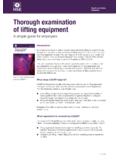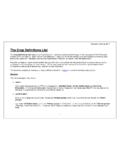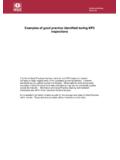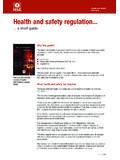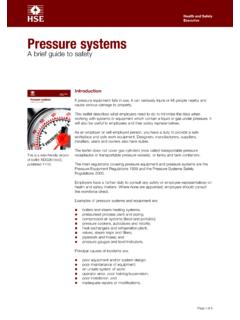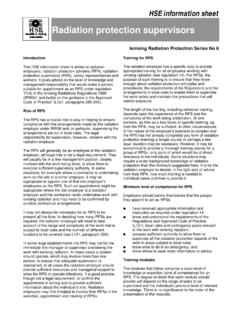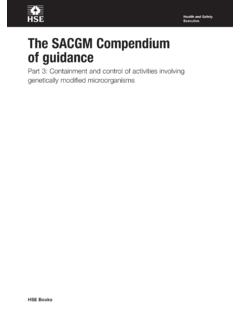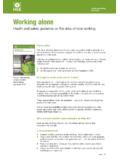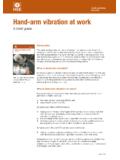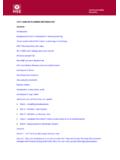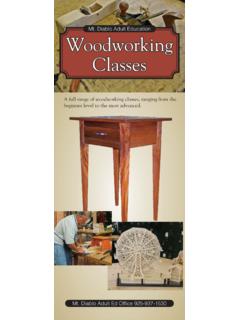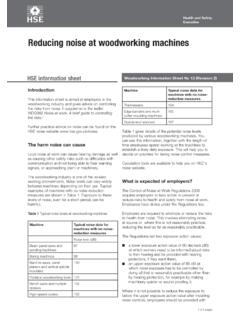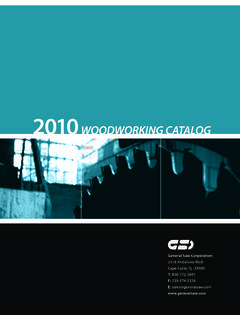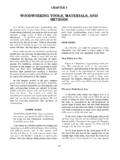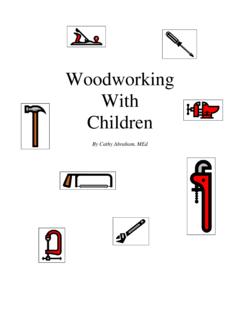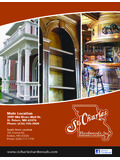Transcription of Example risk assessment: Woodworking company
1 1 of 4 pagesExample risk assessment : Woodworking companyHealth and Safety ExecutiveExample risk assessment for a Woodworking companyImportant reminderThis Example risk assessment shows the kind of approach a small business might take. Use it as a guide to think through some of the hazards in your business and the steps you need to take to control the risks . Please note that it is not a generic risk assessment that you can just put your company name on and adopt wholesale without any thought. This would not satisfy the law and would not be effective in protecting business is different you need to think through the hazards and controls required in your business for the sceneThe owner/manager did the risk assessment at this company , which manufactures furniture and uses a variety of woods and a range of machinery.
2 Six people are employed and two of them work part-time. The business is located on a small industrial estate, in spacious premises built in 2002 which do not have asbestos-containing materials. There is sufficient space in the yard for loading and unloading company has toilet and washing facilities and a mess room where staff can take their breaks, prepare drinks and heat food. A first-aid kit is kept there and is regularly checked to make sure all necessary items are was the risk assessment done?The manager followed the guidance in Five steps to risk assessment ( ).
3 1 To identify the hazards, the manager:looked at HSE s web pages for Woodworking and for small businesses for free advice and to learn where hazards can occur;walked around the premises, inside and out, noting what might pose a risk, taking into consideration what was learnt from HSE s guidance;talked to staff to learn from their knowledge and experience of areas and activities, and listen to their concerns and opinions about health and safety issues in the workplace; andlooked at the accident book, to understand what had previously resulted in The manager then wrote down who could be harmed by the hazards and For each hazard, the manager wrote down what controls, if any, were in place to manage these hazards.
4 These controls were then compared to the good practice guidance on HSE s website. Where existing controls were not considered good enough, the manager wrote down what else needed to be done to control the Putting the risk assessment into practice, the manager decided and recorded who was responsible for implementing the further actions and when they should be done. When each action was completed, it was ticked off and the date recorded. The risk assessment was displayed in the mess room for all staff to The manager discussed the findings with the staff.
5 A decision was made to review and update the risk assessment every year or straightaway if any major changes in the workplace of 4 pagesExample risk assessment : Woodworking companyHealth and Safety ExecutiveCompany name: A Woodworking company Date of risk assessment : 28/09/07 What are the hazards?Who might be harmed and how?What are you already doing?What further action is necessary?Action by whom?Action by when?DoneExposure to wood dustStaff risk lung diseases, such as asthma, from inhaling wood dust. Hardwood dust can cause cancer, particularly of the exhaust ventilation (LEV) provided at machines and staff are trained in using it maintained to keep it in good condition and working effectively.
6 LEV inspected every 14 months by a competent person. Wood dust cleared up using a suitable vacuum cleaner, fitted with an appropriate respiratory protective equipment (RPE) as well as LEV for very dusty jobs, and staff trained in how to use do health surveillance questionnaire before starting, then affected staff referred to a medical professional. Remind staff of the risks of wood dust, and why these controls are staff never to dry sweep wood dust, which just spreads the dust risk serious and possibly fatal cut injuries following contact with moving parts of machinery, particularly saw blades.
7 All machines guarded according to manufacturers instructions. Guards inspected regularly and maintained as necessary to ensure their good have sufficient space at machines to work safely. Staff monitored by manager to ensure guards always used. All staff trained in safe use of machines by a competent person. All machines braked and fitted with necessary safety features, eg chip limited tooling etc. Download information sheets on the safe use of the machines used in the workshop from HSE website and pin them up in mess handlingStaff may suffer musculoskeletal disorders, such as back pain, from handling heavy/bulky objects, eg timber boards and machinery parts.
8 Also risk cuts when handling tooling, or splinters when handling trained in manual handling. Workbenches and machine tables set at a comfortable height. Strong, thick gloves provided for handling tooling and pallets. Panel trolley and lifting hooks available for moving boards. Systems of work in place for the safe and careful handling of assembled possible, store tooling next to the machine to reduce carrying distance. Manager 30/10/0729/10/07 Remind staff to ask for a new set of gloves when old ones show wear and tear, and not to try to lift objects that appear too of 4 pagesExample risk assessment : Woodworking companyHealth and Safety ExecutiveWhat are the hazards?
9 Who might be harmed and how?What are you already doing?What further action is necessary?Action by whom?Action by when?DoneNoiseStaff and others may suffer temporary or permanent hearing damage from exposure to noise from Woodworking enclosures used where practicable, and maintained in good tooling used where possible. Planned maintenance programme for machinery and LEV systems. Suitable hearing protectors provided for staff and staff trained how to use them. Check and maintain them according to advice given by trained in risks of noise exposure.
10 Staff trained in systems of work to reduce noise exposure (eg suitable feed rates for certain jobs, timber control etc).Consider if certain machines could be safely mounted on anti-vibration 30/10/0729/10/07 Include noise emission in specification for new vertical spindle moulder, to be purchased next Staff may suffer serious, possibly fatal, injuries if struck by a vehicle such as a lift truck or a delivery lorry. Fork-lift truck maintained and inspected as per lease contract. Lift truck operated only by staff who have been trained to use it.
